Eggplants are one of the most well-loved vegetables in the kitchen because of their versatility and ease of preparation. It can be a little unsettling though when you discover that the stash you got from the market isn’t really fully ripe.
But did you know that eggplants, unlike other fruits and vegetables, are best harvested and consumed when they are slightly underripe?
What to Do with An Unripened Eggplant
Eggplants are best harvested and consumed when they are slightly underripe as they would taste sweeter, have a nice, glossy purple or black color, and have the most flavor. Fully ripe and mature eggplants are brown, tough, and can taste bitter and will be disappointing to eat. Waiting to harvest eggplants until they are fully ripe is usually done for the purpose of replanting the seeds.
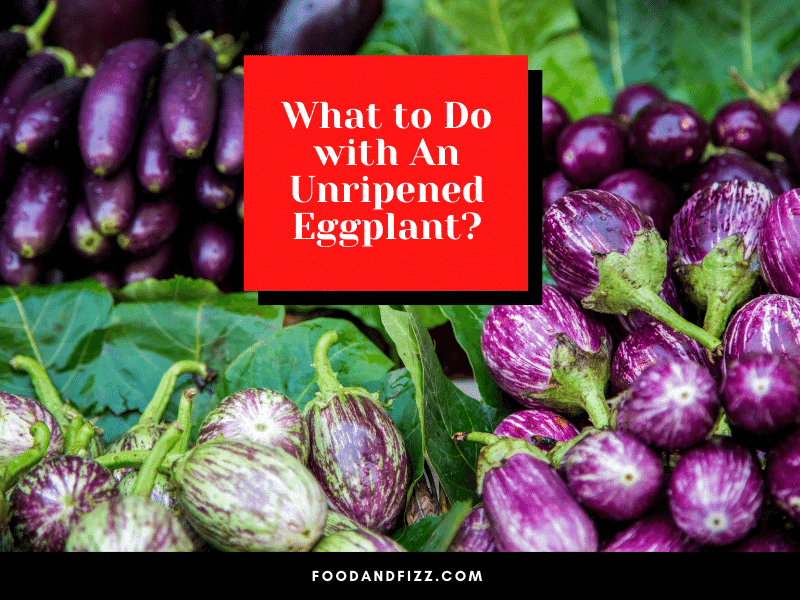
What is an Eggplant?
Eggplants or aubergines are known scientifically as Solanum melongena. The plants that bear these versatile, edible fruits are grown all over the world and thrive in warm climates.
Treated as a vegetable but technically a fruit, eggplants are part of the nightshade family of plants, with the likes of tomatoes and peppers.
There are several varieties of eggplants, with shapes ranging from round to egg-shaped to elongated, with colors anywhere from a bright glossy purple to a dark black to a light purple and white.
It is a staple in Mediterranean, Middle Eastern, and Asian cooking and can be baked, fried, grilled, steamed, roasted, and added to soups and stews. Because it absorbs flavors very well, it is an easy vegetable to add to a variety of dishes.
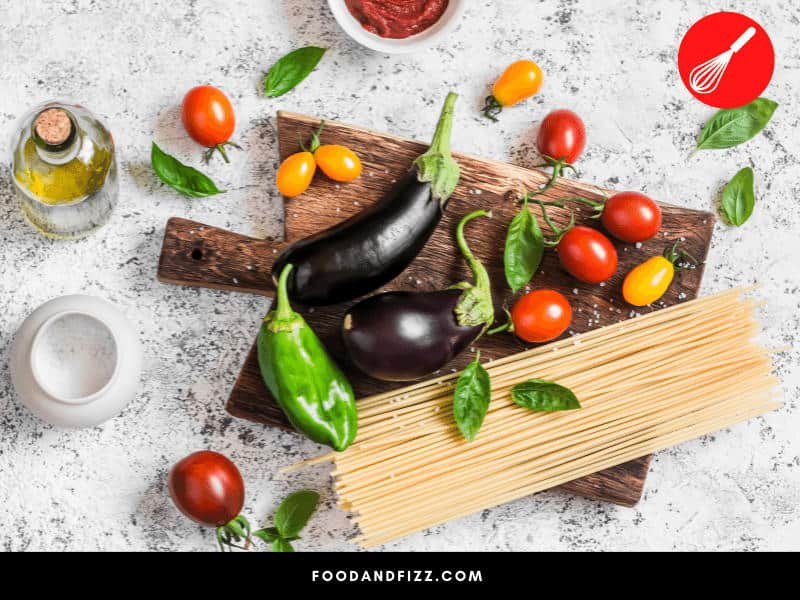
How Are Eggplants Cultivated?
Eggplants need a warm environment to thrive and properly grow. They can be grown outdoors or in pots indoors, as long as the proper growing conditions and requirements are met.
They grow fast between the temperatures of 70-85 °F and slow down in cooler temperatures. Depending on the variety and whether you planted a seed or transplanted it, eggplants can be ready for harvesting about 2-4 months after.
When to Harvest?
Experts suggest harvesting earlier and not waiting for the eggplant to fully ripen, as they taste better and sweeter when they are slightly underripe.
Eggplants that ripen on the vine may turn brown very quickly and may taste bitter, and may not be suitable for culinary use. The only reason to wait until they are fully mature before harvesting is if you wish to use the seeds to plant them again.
Harvesting them early also stimulates the plant to keep producing more fruit, which would ensure a prolific and active fruit-bearing plant.
How To Tell if Eggplants are Ready To Be Harvested
Eggplants are ready for harvest when the skin is glossy and the color of the eggplant is uniform. When poked or pressed, it should bounce back. If it doesn’t, it is too young to harvest. If the indentation stays, it means it is overmature.
Eggplants that are at their prime flavor and condition should be firm but not too hard. The flesh should also be cream-colored and the seeds of the eggplant should be fully formed. Eggplants harvested too late or too early may taste bitter and unappealing.
Experts say harvesting eggplant is an art form and is something you can intuitively learn over time.
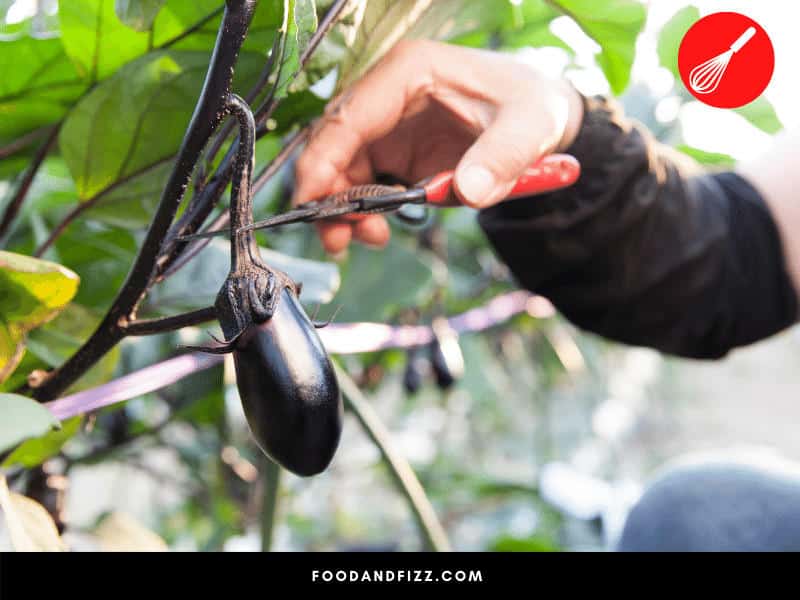
What Are Nightshade Vegetables and Should I be Concerned?
As we said, eggplants are part of a vegetable family called nightshades. Nightshades are a group of plants that contain alkaloids, which are chemicals that affect many processes in the body.
These alkaloids are naturally occurring in the plants’ leaves, roots, and fruit in varying degrees as a means of defense to protect the plant. Nicotine and morphine are two of the more well-known of this type of compound.
The alkaloid found that is found in eggplant is called Solanine. Solanine is toxic when consumed in large amounts, but the amount found in eggplant is not much to be a cause for concern.
It is much more concerning in improperly stored potatoes, especially those that are green, unripe, and have been exposed to the sun.
Some other edible plants that are part of the nightshade family include:
- Bell Peppers
- Eggplants
- Tomatoes
- Potatoes (but not sweet potatoes)
Interestingly enough, tobacco is also part of this family, as is belladonna, a deadly nightshade plant used since ancient times that are known by dramatic names like “murderer’s berries” or “sorcerer’s berries”.
Despite the sinister name and sinister past, belladonna does have useful components which are extracted today as part of some medicines.
While eggplant does have notorious family members, there’s no need to be worried about the safety of consuming eggplants. Eggplants that are properly grown, harvested, and prepared, can be safely enjoyed and can be a part of a healthy diet.
What to Do with Unripened Eggplant? Safe to Eat?
So you harvested your eggplants too early or got eggplants from someone that got a little too excited to show you the fruits of their labor. What do you do with these eggplants? Are they safe to consume?
Yes, you can safely eat your underripe eggplants.
Eggplants are best harvested slightly underripe as it is in this condition that they have the best color, flavor, and texture. Fully mature eggplants are brown, spongy, and can taste too bitter, which will definitely not be a joy to eat and use in recipes.
The only reason you would need to wait to harvest your eggplant until they are fully mature is if you plan to use the seeds for planting.
But what about if I have eggplants that are underripe?
Immature eggplants can be harder, so if you want to use them in recipes, you can do the following things:
1. Put them in a brown paper bag and leave to soften for a few days
Eggplants do not really ripen properly after being picked but you can put your eggplants in a brown paper bag for a few days to allow them to soften so they can be used more easily in recipes.
2. If you want to get rid of some of the bitterness, slice the eggplants and salt them.
Salting eggplants is a heavily debated topic with people polarized on both sides of the spectrum. What salting does is it draws out the moisture from the eggplants and tenderizes it, and it also draws out some of the natural bitterness in the eggplant.
This step may have been necessary in the olden days when they did not have anything but bitter eggplants, but apparently, today’s eggplants do not have those innate bitter characteristics anymore, making salting an optional step.
I guess it would depend on what recipe you want to use your eggplant for. If it’s for something like eggplant parmigiana where you need the texture to be creamier, salting might help it achieve the desired texture.
To salt your eggplants, simply slice, lay them out on a wire rack over a baking sheet, or place them in a colander over a bowl. Sprinkle salt generously and leave to sit for about half an hour. Rinse in cold water and dry them. After drying, they can be used in your recipes.
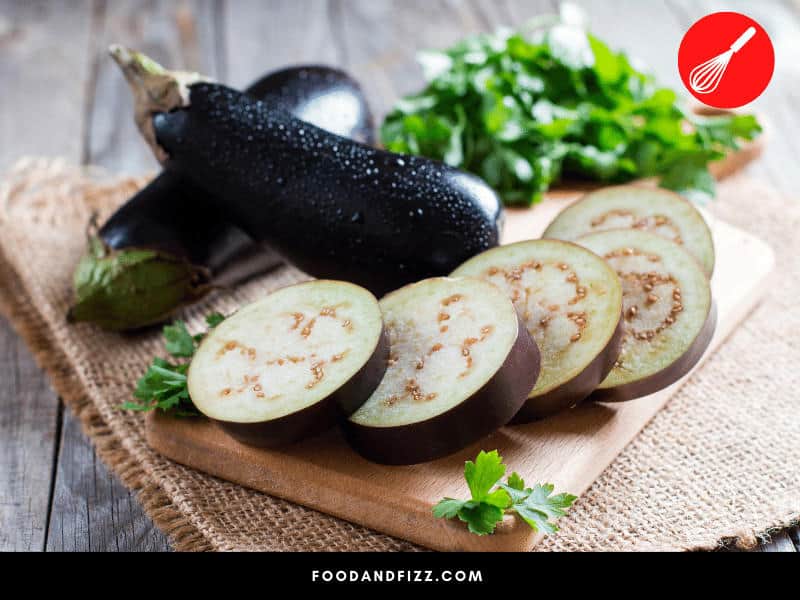
3. Cube your eggplants and add it to stews and soups
You can also use your underripe eggplant in soups and stews, where the liquid can help tenderize it and help it to break down. Simply cube your eggplants and allow them to cook for longer and absorb the extra liquid in your dish.
4. Rub with olive oil and salt and roast in the oven.
You can cut the eggplants in half and rub them with olive oil, salt them and roast them in the oven. Once they soften, you can enjoy as is or cube them and add them to other vegetable dishes.
Do not worry if your eggplant is underripe. You can still use and enjoy it in many different recipes.
Depending on the texture you are going for, you can take the time to salt them and tenderize them, roast them, or chop them up and add them straight away to your soups and stews.
Risks of Eating Unripe Eggplant
A Chemical Called Solanine
Eggplants, whether ripe or underripe, contain a naturally-occurring compound called Solanine. This is a characteristic that is common in the nightshade family of vegetables.
Solanine in small amounts does not cause harm to the human body but consumed in large amounts, it can have detrimental effects.
Some signs of solanine poisoning include:
- Diarrhea
- Vomiting
- Nausea
- Fever
- Breathing difficulties
- Stomach and Muscle cramps
- Slurred speech
- Confusion and dizziness
An overload of solanine in the human body can eventually lead to organ failure and death.
While solanine is present in eggplants, the amounts are so minuscule that they do not pose a threat to us. According to experts, you would have to eat an extraordinarily large amount of eggplants in one sitting for the solanine levels to reach a dangerous level.
That said though, it is always best to vary what we are eating to get the maximum nutritional benefit out of our food. Even the healthiest food is not advisable to be consumed in extremely big amounts.
It is best to switch up our vegetables regularly and give our bodies the opportunity to benefit from all the different healthy vegetables out there.
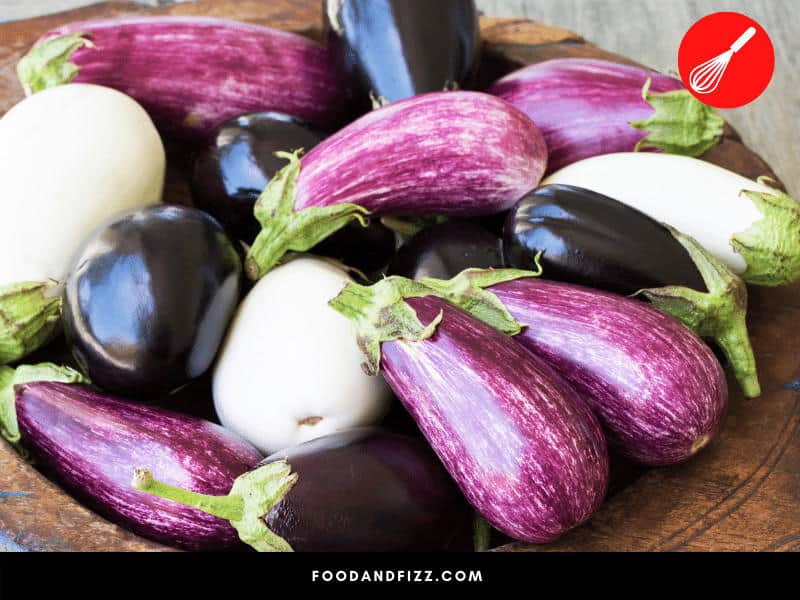
Nightshade Allergies
Aside from solanine intake, some people can be sensitive to or allergic to nightshade vegetables in general. While nightshade sensitivity or nightshade allergies is not as common with eggplant as other nightshade vegetables like tomatoes and peppers, it is possible.
Symptoms of nightshade sensitivities or intolerance include:
- Nausea
- Skin Rashes
- Bloating
- Diarrhea
Some symptoms of nightshade allergies include:
- Swelling of throat
- Difficulty breathing
- Itchiness and Rashes
- Nausea
- Vomiting
- Inflammation
- Pain and swelling
While food intolerance and food allergies share similar symptoms, they affect different systems of the body and are two different conditions.
Food Intolerance or sensitivity affects the digestive system, while a food allergy stimulates a response from the immune system.
Someone with food intolerance can often consume the questionable food and experience gastrointestinal discomfort, but allergies are a different thing. Allergies can be life-threatening and in cases like this, immediate medical attention is required.
Conclusion to What to Do with Unripened Eggplant
An underripe eggplant is safe to eat provided that it was grown, harvested, and prepared properly. As eggplants are part of the nightshade family, they naturally have certain compounds that when consumed in large amounts, could have detrimental effects on our health.
It would, however, take a whole lot of eggplants to reach this danger threshold, and as such, provided that one is not allergic or sensitive to it, eggplants can still be part of a healthy, balanced diet.
Underripe eggplants can be used in stews, soups, roasted and fried, and can be prepared so that they may be used as usual in your recipes.
Frequently Asked Questions to What To Do With Unripened Eggplant
Can Eggplant Ripen on the Counter After it is Harvested?
Eggplants do not usually ripen after being picked but you can put them in a brown bag and leave them to soften for a few days to make them easier to use.
Is it Okay to Eat Underripe Eggplant?
Eggplants are usually harvested just slightly underripe, as it is in this state that they have the best texture and flavor. Waiting to harvest eggplants until they are fully ripe will lead to eggplants that won’t be palatable to eat.
What Are the Risks of Eating Eggplant?
Eggplants, like others in the nightshade family, contain compounds called alkaloids that, when consumed in large amounts, can cause gastrointestinal and neurological symptoms. However, in the case of eggplant, you would have to consume an extremely large and impractical amount of eggplants to reach these dangerous levels.

